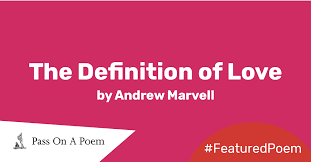Critical analysis of The Definition of Love: Metaphysical elements in The Definition of Love
‘The Definition of Love’
is probably the foremost truly metaphysical poem of Marvell having some
similarity with Donne in using metaphysical conceit and theme. Andrew Marvell
talks about the nature of love, which exists between the poet and his beloved. The
poet regards this love as being perfect and therefore unattainable. Common
metaphysical elements are an elaboration of similes and metaphors, extended poetic
conceits and paradoxes, colloquial speech, and an interest in exploring the
interplay between the physical and spiritual world.
At the very opening of the poem, the speaker expresses the characteristics and origin of his love. His love features
a strange and high object and “was begotten by despair upon impossibility”,
that is, his supreme or divine love is born of the union of despair and
impossibility of physical union. Only determined despair can show him such a
spiritual love while hope has no contribution to his love. As the speaker says-
“My love is of a birth as rare
As ’tis for object strange and high;
It was begotten by Despair
Upon Impossibility.”
Yet he might reach his destination, his
extended soul. But ‘Fate’ always prevents him from being united sort of a
carpenter drives iron wedges into a log of wood so as to separate it into two
parts. Her ‘Decrees of Steel’ have placed them because the ‘distant Poles’ thus
fate is their ‘Tyrannick’ enemy.
Besides, the poet thinks that only
“magnanimous” or resolute despair could produce such a noble feeling as love in
him. In his case, the feelings of love proved to be weak. Here the poet uses a
simile of a bird with gaudy but feeble wings to compare it with his hope of
love. His heart tried to promise him fulfillment but its effort proved to be
futile. So the poet thinks his love could never have been fulfilled. As we
find-
“Magnanimous Despair alone
Could show me so divine a thing
Where feeble Hope could ne’er have flown,
But vainly flapp’d its tinsel wing.”
Then the speaker, as in ‘To His Coy
Mistress’, tells that their union would be possible if three impossible
conditions are fulfilled – first if the ‘Giddy Heaven fall’, if a ‘new
Convulsion’ destroy the early and if the world turns into a ‘Planisphere’.
‘But’, as in the case of ‘To His Coy
Mistress’, their union is not possible, because their motion is ‘parallel’ not
‘oblique’ and there is no possibility of union, though these are infinite.
‘Therefore’ the conclusion is that
though love is a bond between them, it'll not be fulfilled, because ‘Fate with
jealous Eye does see’ at them. Their situation is ‘Conjunction of the mind’ but
‘Opposition of the Stars’. That is, they are spiritually united but physically
separated. As the narrator narrates-
“But Fate does iron wedges drive,
And always crowds itself betwixt.”
Now, if we compare the poem with ‘To His
Coy Mistress’ we notice some similarities and a few dissimilarities at an
equivalent time. From a thematic aspect, it is opposite to the previous one.
Because the former urges the beloved to be physically united. But the latter
affirms that their physical union is completely impossible.
Like the previous one, fate has an
inevitable role during this poem. She does not allow ‘two perfects love’ to be
united, because their union would ruin her tyrannical power.
“For Fate with jealous eye does see
Two perfect loves, nor lets them close;
Their union would her ruin be,
And her tyrannic pow’r depose.”
The poem, being a superb Metaphysical
poem, draws a variety of images and Metaphysical conceits. They are drowned from
different sources of knowledge and provide a display of knowledge. A first,
their love is ‘begotten by Despair upon impossibility.’ Here the abstract idea
is expressed sort of a concrete thing. The three conditions are excellent
examples of this kind of conceit. Comparing their position, to the parallel
lines actually draws our attention and displays knowledge.
Thus we see that ‘To His Coy Mistress’
is extremely passionate in tone but The Definition of affection is
completely pessimistic.
In conclusion, it can be said that the
poem ‘The Definition of Love’ is perhaps the most truly metaphysical poem of
Andrew Marvell having some similarity with Donne in using metaphysical conceit
and theme. He talks about the nature of love, which exists between the poet and
his beloved. The poet regards this love as being perfect and therefore
unattainable. Common metaphysical elements are discussed above.
You May Need:
- The eighteenth-century English social picture in The Rape of the Lock
- Various Important Aspects of Belinda’s Character/ The Character of Belinda
- Nature in Shelley’s Adonais
- Treatment of Man and Lady in Don Juan
- A Valediction: Forbidding Mourning: Donne's way of argument for his pure love with metaphysical conceits
Ernest Miller Hemingway's ‘The Old Man and the Sea’ as a Allegory of Struggle of Life

Comments
Post a Comment